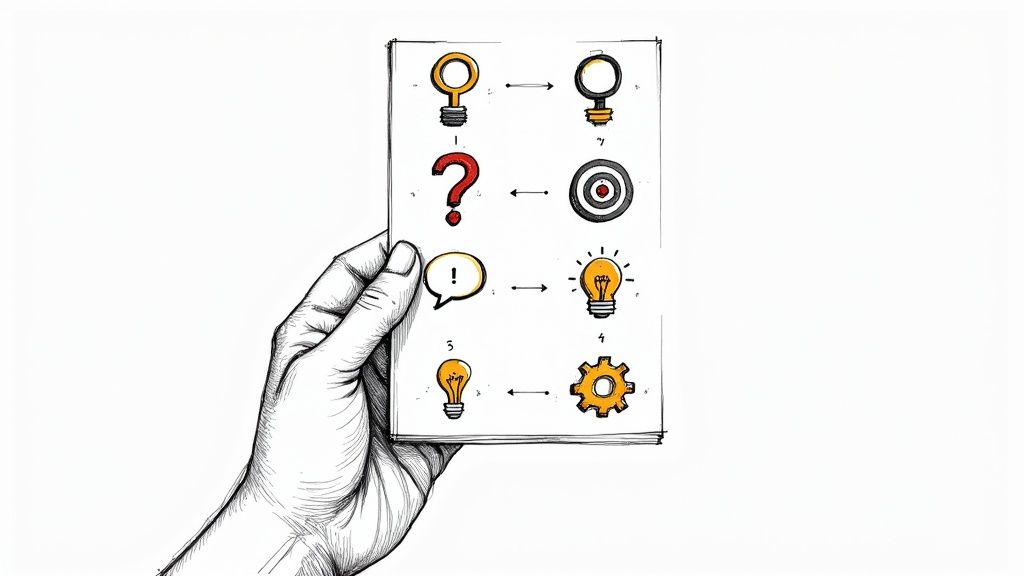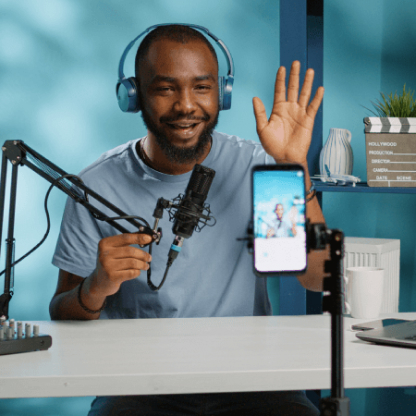Let's be honest, most initial interviews are a colossal waste of time. You wade through a sea of polished resumes and rehearsed answers, only to realize halfway through that the candidate who looked perfect on paper can't string together a coherent thought. It's the recruitment equivalent of getting catfished. Hope you enjoy spending your afternoons fact-checking resumes and running technical interviews, because that’s now your full-time job.
Or… you could get smarter.
I've been there, mortgaging the metaphorical office ping-pong table to afford another recruitment cycle that goes nowhere. The secret isn't a bigger budget; it's a better filter. These aren't your typical, fluffy HR queries. These are the battle-tested pre interview questions we've used to cut through the noise and identify real talent before they ever eat up an hour on our calendar. Think of this as your new front line.
This listicle will arm you with the specific questions designed to disqualify the wrong candidates and spotlight the right ones, saving you countless hours. To fully equip your team and align your entire interview strategy, you might also want to consult a practical hiring manager interview guide. Let's stop interviewing duds and start hiring winners.
1. Tell me about yourself
Let's start with the classic opener, the one that can either set the stage for a killer interview or send it spiraling into a monologue about a candidate's childhood pet. As one of the most fundamental pre interview questions, this prompt isn't just a casual icebreaker. It’s your first real data point on a candidate's ability to communicate, structure their thoughts, and understand what’s actually relevant.
You’re handing them the microphone; do they know which song to sing? A great candidate sees this as an opportunity, not a pop quiz. They connect their past experiences and future goals directly to the problems you're trying to solve with this hire.
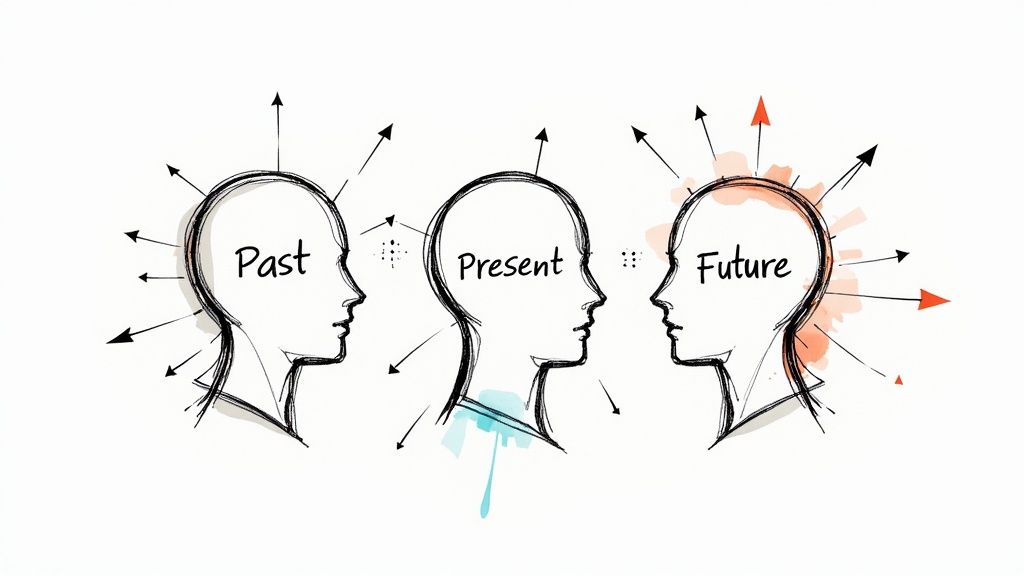
Why This Question Is a Non-Negotiable
This question is a powerful diagnostic tool disguised as a simple greeting. Companies like McKinsey & Company use it to assess structured thinking right from the jump. Can the candidate build a logical, compelling narrative on the fly? Startups, on the other hand, listen for an entrepreneurial mindset. Does their story highlight adaptability, initiative, and a hunger to build something? It’s a litmus test for self-awareness and preparation.
A well-crafted answer to "Tell me about yourself" is a trailer for the candidate's entire professional movie. It should be compelling enough to make you want to see the rest.
How to Coach Candidates for Success
Advise your candidates to ditch the life story and adopt the Present-Past-Future formula. It’s a clean, effective framework that keeps them on track.
- Present: Start with their current role, highlighting key responsibilities and a recent, relevant accomplishment.
- Past: Briefly touch on previous experiences that directly led them to their current expertise and connect to the job they're interviewing for.
- Future: Conclude by explaining why they are excited about this specific opportunity and how their skills will contribute to your specific company.
The whole thing should be a tight 60-90 seconds. Any longer, and they risk losing your attention. The goal is a concise, practiced, yet natural-sounding professional summary that proves they've done their homework and are ready to talk business.
2. Why are you interested in this position?
If "Tell me about yourself" is the trailer, this question is the plot reveal. It cuts through the fluff and gets straight to the candidate's motivation. This is one of those crucial pre interview questions that separates the casual job-browser from the genuinely invested applicant. You’re not just looking for flattery; you’re looking for a clear, logical connection between their ambition and your opportunity.
Is this just another application in their daily quota, or have they actually pictured themselves solving your problems? A great answer shows they've done their homework and see this role as a strategic next step, not just a paycheck.
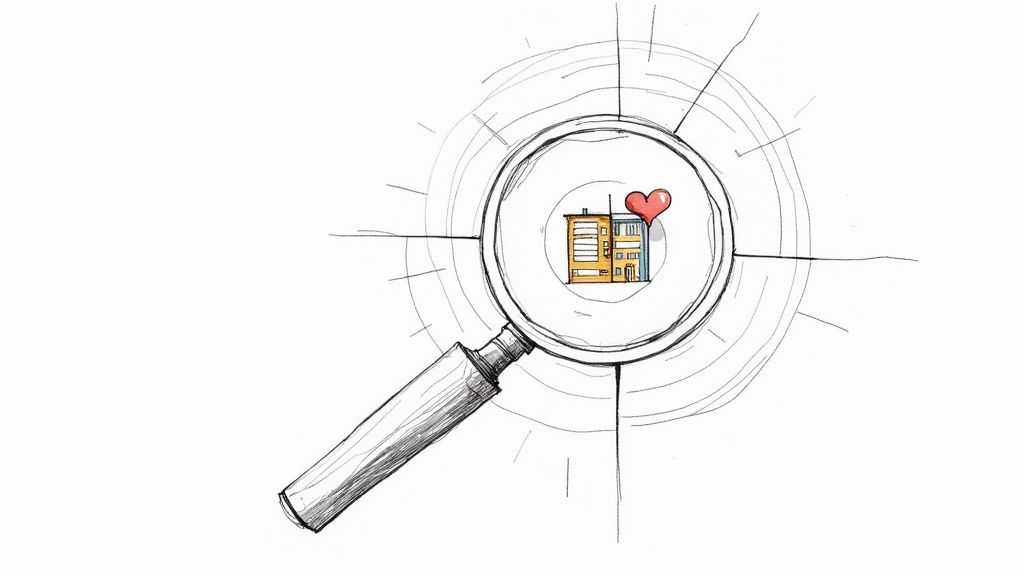
Why This Question Is a Non-Negotiable
This question is your best filter for passion and alignment. Apple famously looks for candidates who bleed its six-color logo and can articulate a genuine passion for its products. In contrast, non-profits like Doctors Without Borders need to see an unwavering commitment to their humanitarian mission. It’s not just about skills; it’s about buy-in. A candidate who can’t articulate their "why" is a major red flag, signaling a potential lack of engagement down the line. You can explore more preliminary interview questions to see how this fits into the broader screening process.
An answer lacking specificity is a warning sign. It suggests the candidate is more interested in any job than this job.
How to Coach Candidates for Success
Tell your candidates to avoid generic praise like "I've heard great things about the company culture." Instead, guide them to build a three-part answer that is specific and compelling.
- Connect to the Company: Advise them to mention a recent company achievement, a core value from the mission statement, or a specific product they admire. This proves they’ve done their research.
- Align with the Role: They should pinpoint 1-2 key responsibilities from the job description and connect them directly to their own skills and career goals.
- Show Their Value: The answer should end by briefly explaining what excites them about the challenges of the role and how they envision themselves contributing to the team's success.
3. What are your greatest strengths?
This question is where candidates get to step into the spotlight and sell you their highlight reel. As one of the most common pre interview questions, it’s a direct invitation for them to align their best attributes with the core needs of the job. You’re not just looking for a laundry list of positive adjectives; you’re testing their self-awareness and ability to connect their skills to your problems.
A great candidate won't just say they're a "problem-solver." They'll prove it with a story that demonstrates how they identified, analyzed, and solved a problem that cost their last company time or money. This question separates the prepared from the winging-it crowd.

Why This Question Is a Non-Negotiable
This prompt is a direct line into a candidate’s value proposition. Methodologies like Gallup's StrengthsFinder have shown that people who focus on their strengths are more engaged and effective. When you ask this, you’re looking for evidence of that focus. Amazon, for example, listens for strengths that map to its leadership principles like ownership or customer obsession. A consulting firm, in contrast, wants to hear about analytical prowess and structured thinking.
A candidate's answer reveals not only what they're good at, but also if they understand what it takes to be good at the job they're applying for.
How to Coach Candidates for Success
Tell your candidates to forget vague clichés like "hard worker" and get specific. The key is to choose strengths that are both authentic and highly relevant to the job description, then back them up with proof.
- Be Specific and Relevant: Advise them to select two or three core strengths directly from the job description. If the role requires managing multiple projects, a great strength to highlight is "project prioritization" or "stakeholder communication."
- Provide Concrete Examples: For each strength, they should have a brief, powerful story ready. The STAR method (Situation, Task, Action, Result) is perfect for structuring this, especially focusing on a quantifiable Result.
- Connect to Future Value: The answer should end by connecting their strength to how it will directly benefit your company. For instance, "My ability to build strong client relationships will help me exceed the sales targets you've set for this team."
4. What is your biggest weakness?
Ah, the question that makes even the most confident candidates squirm in their seats. This classic query isn't about digging for fatal flaws or finding a reason not to hire someone. As one of the most revealing pre interview questions, its true purpose is to test for self-awareness, honesty, and a commitment to personal growth. You’re essentially asking: “Are you humble enough to know you’re not perfect, and proactive enough to do something about it?”
A candidate who fumbles here, or worse, gives the dreaded “I’m a perfectionist” non-answer, is raising a red flag. The best candidates, however, view this as a chance to demonstrate maturity and a growth mindset, turning a potential pitfall into a showcase of their character.
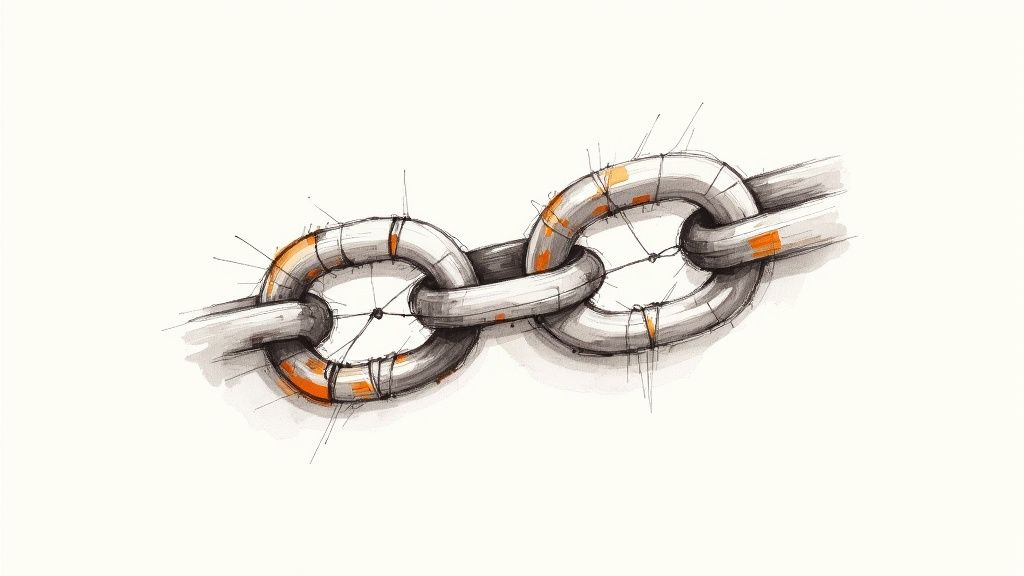
Why This Question Is a Non-Negotiable
This question is a powerful filter for emotional intelligence. Tech companies like Google use variations of this to gauge learning agility; can an engineer admit to a knowledge gap in a new programming language and show how they’re actively upskilling? For leadership roles, it’s a test for humility. A candidate who can thoughtfully discuss a past tendency to micromanage and the steps they've taken to trust their team is infinitely more valuable than one who claims to have no faults. It separates the candidates who have genuinely reflected on their professional journey from those who have only memorized interview scripts.
An honest answer about a weakness doesn't show inadequacy; it shows a candidate who is secure enough to be vulnerable and driven enough to improve.
How to Coach Candidates for Success
Steer your candidates away from clichés and toward genuine, structured reflection. Advise them to pick a real, manageable weakness and frame it as a story of growth. The STAR-L (Situation, Task, Action, Result, Learning) method works wonders here.
- Choose a real but non-critical weakness: It should be relevant but not a core competency for the job (e.g., an accountant shouldn't say their weakness is attention to detail).
- Explain the situation and its impact: Briefly describe a scenario where this weakness manifested.
- Detail the corrective actions: This is the most crucial part. What specific steps did they take? Did they read a book, take a course, seek mentorship, or adopt a new productivity system?
- Show the positive result and learning: Conclude by explaining how these actions have helped them improve and what they’ve learned in the process.
The goal is to present a narrative of proactive self-improvement, proving they are a coachable and self-aware asset to any team.
5. Where do you see yourself in five years?
This classic question is often dreaded by candidates, but for you, it's a goldmine. It's one of those essential pre interview questions that cuts through the noise to reveal a candidate's ambition, foresight, and most importantly, their potential alignment with your company's future. You're not asking for a binding contract; you're trying to see if their roadmap even shares the same continent as yours.
Are they looking for a quick stepping stone, or are they genuinely interested in growing with you? A great candidate has thought about this and can articulate a vision that harmonizes with the opportunities your role and company can realistically offer.
Why This Question Is a Non-Negotiable
This question is your crystal ball for assessing long-term fit and potential retention. Big consulting firms use it to find people aspiring to partnership or senior client leadership, signaling a commitment to the grueling path ahead. In tech, the answer can reveal if a candidate wants to move into product management, people leadership, or become a principal engineer, helping you map their potential trajectory. It tells you if you're hiring an employee or a future leader.
A candidate's five-year plan is a direct indicator of whether you're making a short-term patch or a long-term investment.
How to Coach Candidates for Success
Advise candidates to steer clear of hyper-specific job titles ("I want to be the VP of this department!") and focus on growth and impact instead. This keeps their answer ambitious yet flexible.
- Focus on Skills & Growth: They should talk about the expertise they want to develop, such as mastering a new technology, leading larger projects, or gaining client-facing experience.
- Connect to the Company: Encourage them to tie their ambitions directly to the company. For example, "I'm excited by this role because it seems like a place where I can grow into a senior technical lead as the company expands its product line."
- Show Realistic Ambition: The goal is to sound driven, not delusional. The answer should reflect a career path that is challenging but achievable within your organization. This proves they've researched the company's structure and see a future for themselves there.
6. Why are you leaving your current job?
This is where you separate the career-builders from the job-hoppers. As one of the most revealing pre interview questions, this prompt is designed to uncover a candidate’s true motivations, level of professionalism, and their ability to navigate workplace politics without setting off a trail of scorched earth behind them. It’s a tightrope walk, and you’re about to see how well they balance.
Are they running away from something negative, or are they running towards a positive opportunity? Their answer is a direct window into their professional maturity and what they truly value in a role. A great candidate frames their departure as a logical next step in their career, not a dramatic escape.
Why This Question Is a Non-Negotiable
This question tests a candidate's diplomacy and self-awareness. In fast-paced tech companies, interviewers listen for answers that show a desire for more significant challenges or to work with newer technologies, signaling ambition. In more established industries like finance or healthcare, the focus might be on hearing about a desire for a better work-life balance or a clearer path for advancement, indicating a long-term mindset. It’s a red-flag detector wrapped in a simple query.
The answer to "Why are you leaving?" tells you more about a candidate's past than their resume ever will. It reveals their attitude, resilience, and what they'll likely say about you one day.
How to Coach Candidates for Success
Instruct candidates to avoid bad-mouthing their current or former employers at all costs. The key is to be positive and forward-looking.
- Focus on the Pull, Not the Push: Frame the answer around the opportunities your role offers, not the problems they’re leaving behind. It’s about what they’re moving to, not from.
- Emphasize Growth: Coach them to talk about seeking new challenges, acquiring new skills, or taking on more responsibility that their current role can no longer provide.
- Be Honest but Diplomatic: If the reason is a re-org or layoff, they should be direct and professional. If it's about a difficult manager, they can frame it as seeking a "different leadership style" or a "more collaborative culture."
A concise, positive, and future-focused answer shows they are a strategic professional making a deliberate career move, not just an employee looking for the nearest exit sign.
7. Describe a challenging situation and how you handled it
Here it is: the question that separates the talkers from the doers. This is where theory hits a brick wall and real-world experience takes the stage. As one of the most revealing pre interview questions, this prompt is designed to dig past polished resume points and see how a candidate actually behaves when things go sideways. You’re not just asking for a story; you’re asking for evidence of resilience, problem-solving, and grace under pressure.
This question moves the interview from "what you say you can do" to "what you have actually done." A great candidate will have a relevant, concise, and impactful story ready to go, demonstrating not just that they survived a challenge, but that they learned something from it.
Why This Question Is a Non-Negotiable
This question is a goldmine for assessing critical competencies. It’s famously used in Amazon's behavioral interviews to test their Leadership Principles like "Ownership" and "Bias for Action." For a project manager, their story might reveal how they handle scope creep; for a developer, it could show their methodical approach to a critical bug. It’s your best window into their on-the-job character and decision-making process when nobody is watching.
How someone talks about a past challenge tells you everything about their accountability, problem-solving approach, and potential to handle your company's future challenges.
How to Coach Candidates for Success
The only way to answer this is with the STAR method. It’s a bulletproof framework that prevents rambling and ensures they deliver a complete, compelling narrative.
- Situation: Briefly set the scene. What was the context of the challenge?
- Task: What was their specific responsibility or goal in that situation?
- Action: Describe the specific steps they took. This is the core of the answer.
- Result: What was the outcome? They must quantify the impact and share what they learned.
Encourage them to pick an example that’s relevant to the role they want and to focus on their individual contributions. A powerful story here can be more persuasive than any skill listed on their resume. Candidates can learn more about tackling workplace issues with grace to prepare even better answers.
8. Do you have any questions for us?
This isn't just a polite closing; it's the final and often most revealing data point in the interview. When you flip the script and ask, "Do you have any questions for us?", you're handing the candidate the steering wheel. Their response tells you more about their priorities, critical thinking, and genuine interest than almost any other question in your arsenal.
A candidate with no questions is a walking red flag. It signals a lack of preparation or, worse, a lack of curiosity. On the other hand, a candidate who asks insightful, well-researched questions demonstrates that they see this as a two-way street. They aren't just looking for a job; they're trying to determine if this is the right job.
Why This Question Is a Non-Negotiable
This classic closer is one of the most effective pre interview questions for gauging a candidate's level of engagement and critical thought. At Google, candidates are expected to ask questions that probe the company's innovation processes and team dynamics. For a fast-growing startup, you want to hear inquiries about growth trajectory, funding runways, and equity potential. It's a direct look into what truly motivates them.
A candidate's questions are a window into their mind. They show you what they value, what they fear, and how deeply they've considered their future with your company.
How to Coach Candidates for Success
Advise your candidates to treat this as their final pitch. It's their chance to show they're thinking like a future team member, not just a job applicant. Preparing for this final moment is also one of the most crucial virtual interview tips to master, as it leaves a lasting impression.
- Prepare Thoughtfully: They should come with 3-5 well-researched questions that can't be answered by a quick skim of your website.
- Focus on the Role and Team: Encourage questions about success metrics for the first 90 days, team culture, or the biggest challenges the team is currently facing.
- Show Ambition: Questions about professional development opportunities, career paths, and how the company supports employee growth show long-term thinking.
- Avoid the Obvious: Tell them to skip questions about salary (until the offer stage) or basic company facts. This is their moment to demonstrate strategic thinking.
Pre-Interview Questions Comparison Table
| Interview Question | Implementation Complexity 🔄 | Resource Requirements ⚡ | Expected Outcomes 📊 | Ideal Use Cases 💡 | Key Advantages ⭐ |
|---|---|---|---|---|---|
| Tell me about yourself | Low – straightforward intro | Minimal – verbal communication | Assess communication, self-awareness, cultural fit | Opening interview, assessing narrative control | Reveals concise storytelling, eases candidate in |
| Why are you interested in this position? | Moderate – requires candidate research | Low – verbal response | Gauge motivation, alignment with company & role | Screening for genuine interest and retention | Filters out indifferent candidates, shows preparation |
| What are your greatest strengths? | Moderate – self-assessment focused | Low – verbal, requires reflection | Identify relevant skills, self-awareness, confidence | Roles requiring specific competencies and confidence | Highlights candidate’s value and role fit |
| What is your biggest weakness? | Moderate – introspective and honest | Low – verbal, requires sincerity | Assess honesty, growth mindset, and coachability | Evaluating self-awareness and development potential | Reveals growth orientation, commitment to improvement |
| Where do you see yourself in five years? | Moderate – forward-looking | Low – verbal, reflective | Understand ambition, career planning, retention likelihood | Long-term roles, assessing alignment with company growth | Assesses ambition and growth mindset |
| Why are you leaving your current job? | Moderate – requires tact and honesty | Low – verbal, sensitive topic | Reveal motivations, professionalism, potential red flags | Transition roles, understanding candidate drivers | Identifies thoughtful career moves and conflict handling |
| Describe a challenging situation and how you handled it | High – behavioral, structured storytelling | Low – verbal, detailed examples | Evaluate problem-solving, resilience, decision-making | Behavioral interviews, high-stakes roles | Predicts future performance via past behavior |
| Do you have any questions for us? | Low – closing stage | Minimal – preparation required | Show genuine interest, critical thinking, cultural fit | Interview closing, gauging candidate engagement | Demonstrates preparation and strategic thinking |
The Takeaway: Your Calendar Will Thank You
Let’s be honest. Nobody gets into HR or talent acquisition because they love scheduling introductory phone calls. You’re here to find exceptional people, not play calendar Tetris. The list of pre interview questions we’ve dissected isn’t about adding more steps to your process; it’s about making the initial step brutally effective. It's about moving from a high-volume, low-signal process to a low-volume, high-signal one.
The goal is simple: stop wasting your most valuable asset, time, on candidates who aren't a fit. Every 30-minute “get-to-know-you” call with someone who clearly didn’t read the job description is a half-hour you could have spent strategizing with a hiring manager or closing a top-tier candidate. By front-loading your process with thoughtful, targeted questions, you filter out the noise before it ever hits your calendar.
The Real Cost of a Bad Screening Process
Think about the ripple effect of a weak initial screen. It’s not just one wasted call. It’s a cascade of inefficiency:
- Wasted Hiring Manager Time: You pull a busy department head into an interview with a candidate who should have been screened out. Their trust in your process erodes.
- Delayed Time-to-Hire: Your pipeline gets clogged with mismatched applicants, pushing back the timeline for finding the right person.
- Recruiter Burnout: You spend your days having the same surface-level conversation over and over, which is a one-way ticket to exhaustion and frustration.
A strategic set of pre interview questions acts as your first line of defense. It’s the difference between hoping for a good fit and engineering one from the very first touchpoint. You’re not just asking "Why do you want this job?"; you’re asking for proof of intent, self-awareness, and genuine alignment.
Making It Actionable: Your Next Move
Don’t just read this list and nod along. Put it into practice this week. Pick three questions from this article that directly address the biggest gaps in your current screening process. Integrate them into your applicant tracking system’s initial questionnaire or, even better, use them in an asynchronous video screen.
The true power of this approach isn't just in the questions themselves, but in how you deploy them. By letting candidates record answers on their own time, you get more thoughtful, less-rehearsed responses. You also get your schedule back. You trade dozens of live calls for a curated playlist of the most promising applicants. It's about working smarter, not harder. The best hiring teams aren't the ones with the most packed calendars; they're the ones with the most intentionally empty ones. Now go get yours back.
Tired of the endless screening calls? We built Async Interview to solve exactly this problem, letting you implement these pre interview questions at scale with asynchronous video. Reclaim your calendar and focus only on the candidates who truly matter. Give Async Interview a try today.
